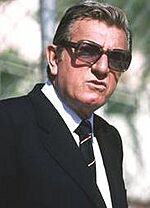Jean-Marie Balestre facts for kids
Quick facts for kids
Jean-Marie Balestre
|
|
|---|---|

Jean-Marie Balestre as FIA President
|
|
| President of the Fédération Internationale de l'Automobile | |
| In office 1985 – 23 October 1993 |
|
| Preceded by | Paul Alfons von Metternich-Winneburg |
| Succeeded by | Max Mosley |
| President of the Fédération Internationale du Sport Automobile | |
| In office 1978–1991 |
|
| Preceded by | Pierre Ugeux |
| Succeeded by | Max Mosley |
| Personal details | |
| Born | 9 April 1921 Saint-Rémy-de-Provence, Bouches-du-Rhône, France |
| Died | 27 March 2008 (aged 86) Saint-Cloud, Paris, France |
Jean-Marie Balestre (born 9 April 1921 – died 27 March 2008) was a French leader in auto racing. He was the President of the Fédération Internationale du Sport Automobile (FISA) from 1978 to 1991. He also served as the President of the Fédération Internationale de l'Automobile (FIA) from 1985 to 1993. These organizations are very important in the world of car racing.
Contents
Early Life and World War II
Jean-Marie Balestre was born in Saint-Rémy-de-Provence, France. He studied law in Paris. After his studies, he worked as a journalist for different newspapers and magazines.
During World War II, Balestre was involved in the conflict. He later said he worked secretly for the French Resistance, which fought against the occupation of France. In 1968, he received a special award called the Legion of Honour for his service to France.
Career in Motorsport
After the war, Balestre continued his work as a journalist. He worked for a successful French car magazine called L'Auto-Journal. This work helped him become quite wealthy.
He was one of the people who helped start the Fédération Française du Sport Automobile (FFSA) in 1950. This is a French national motorsport group. In 1961, he became the first president of the International Karting Commission of the FIA. Karting is a type of racing with small, open-wheel cars.
In 1973, he was elected president of the FFSA. Then, in 1978, he became president of the FIA's International Sporting Commission. He played a big part in changing this commission into the Fédération Internationale du Sport Automobile (FISA) in 1978.
The FISA–FOCA War
In the early 1980s, Balestre was deeply involved in a big disagreement called the FISA–FOCA war. This was a fight over money and who had control of the Formula One World Championships. The main people involved were Balestre and Bernie Ecclestone.
They finally settled their dispute after Enzo Ferrari, a famous car maker, helped them find a solution. Balestre signed the first Concorde Agreement. This agreement gave FOCA the business rights to Formula One. The FIA, led by Balestre, kept control over all the rules for racing and car design.
Improving Safety in Racing
Balestre made important changes to make Formula One safer. He introduced specific rules for crash tests for the cars. This helped improve how safe the cars were in accidents. He also strongly supported changing to naturally aspirated engines in 1989. He believed this change was also important for safety.
However, Balestre also made a controversial decision in 1986. After two rally drivers died in a crash, he decided to ban Group B rallying. This was a very fast and powerful type of rally car. He wanted to switch to slower, less powerful Group A cars instead.
Controversies and Leadership Changes
Sometimes, Balestre was accused of using his power in ways that were not fair. For example, in 1989, there was a crash between two famous Formula One drivers, Ayrton Senna and Alain Prost, at a race in Suzuka. There were suggestions that Balestre helped Prost win the championship. Senna was disqualified from the race, fined, and even suspended. Years later, after he was no longer president of the FIA, Balestre admitted that he had acted to help Prost in 1989.
Balestre became president of the FIA in 1986, while still leading FISA. In 1991, he lost the election for FISA president to Max Mosley. Facing another likely defeat for the FIA presidency in 1993, Balestre decided to step down. He suggested that FISA should be ended and that Max Mosley should become the new president of the FIA. Balestre continued to be the president of the FFSA until the end of 1996.
Death
Jean-Marie Balestre passed away on 27 March 2008, at the age of 86.
See also
 In Spanish: Jean-Marie Balestre para niños
In Spanish: Jean-Marie Balestre para niños

